The House Bunny
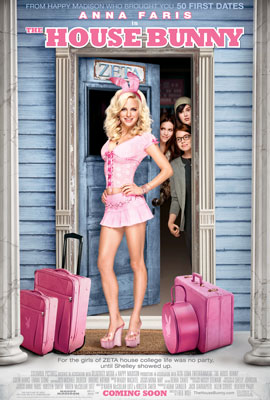
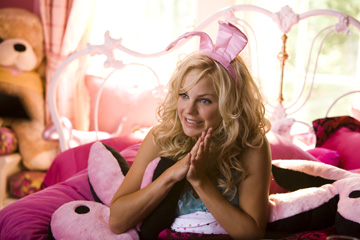 Faris plays Shelley, one of Hefner's top Bunnies, whose entire life revolves around the Mansion. Her only desire in life is to be Miss November and a centerfold in an upcoming issue. Unfortunately, one of the other Bunnies is also gunning for the spot, and decides to employ treachery to get Shelley out of the running. She forges a letter from Hefner, telling Shelley that she's been fired and has to leave the Mansion. Now homeless, Shelley eventually finds her way to a nearby college campus, and through a series of circumstances too complex to summarize here, ends up becoming the House Mother to the Zeta sorority house. As is the case in these kind of campus comedies, the house is home to the school misfits who are ridiculed by the more prettier and popular sororities. But the head girl in the Zeta house, the brainy yet nerdy Natalie (Emma Stone, who can also be seen in this week's The Rocker), realizes that they can use Shelley's ability to attract men to help them gain popularity on the campus, and maybe even save the Zeta house from being lost due to a lack of pledges.
Faris plays Shelley, one of Hefner's top Bunnies, whose entire life revolves around the Mansion. Her only desire in life is to be Miss November and a centerfold in an upcoming issue. Unfortunately, one of the other Bunnies is also gunning for the spot, and decides to employ treachery to get Shelley out of the running. She forges a letter from Hefner, telling Shelley that she's been fired and has to leave the Mansion. Now homeless, Shelley eventually finds her way to a nearby college campus, and through a series of circumstances too complex to summarize here, ends up becoming the House Mother to the Zeta sorority house. As is the case in these kind of campus comedies, the house is home to the school misfits who are ridiculed by the more prettier and popular sororities. But the head girl in the Zeta house, the brainy yet nerdy Natalie (Emma Stone, who can also be seen in this week's The Rocker), realizes that they can use Shelley's ability to attract men to help them gain popularity on the campus, and maybe even save the Zeta house from being lost due to a lack of pledges.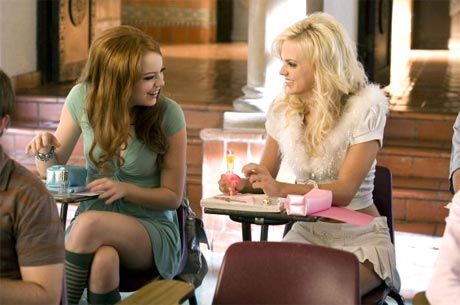 It's not surprising to learn that The House Bunny was written by the same screenwriters as Legally Blonde, as this film shares quite a few similarities with that film. It also borrows from just about every college comedy ever made, from cult classics like Revenge of the Nerds, all the way to last year's slight but likable Sydney White. The movie manages to remain sweet and pleasant throughout, but never really gets any genuine laughs except for whenever Anna Faris is on the screen. This seems to be intended to launch her into leading woman territory, and she certainly seems to be giving it her all as she gives her character a ditzy yet sweet personality that immediately draws the viewer to her. Some of her clueless observations throughout the film get the biggest laughs, such as when a character states "a little bird told me", and Shelley responds with, "I've gotta meet this frickin' bird!". Or when she's giving make up tips to the girls of the Zeta house, and stresses how important the eyes are, as "eyes are the nipples of the face". Her willingness to do or say just about anything for a laugh is infectious, and helps lift the movie up with a lot of energy and spirit.
It's not surprising to learn that The House Bunny was written by the same screenwriters as Legally Blonde, as this film shares quite a few similarities with that film. It also borrows from just about every college comedy ever made, from cult classics like Revenge of the Nerds, all the way to last year's slight but likable Sydney White. The movie manages to remain sweet and pleasant throughout, but never really gets any genuine laughs except for whenever Anna Faris is on the screen. This seems to be intended to launch her into leading woman territory, and she certainly seems to be giving it her all as she gives her character a ditzy yet sweet personality that immediately draws the viewer to her. Some of her clueless observations throughout the film get the biggest laughs, such as when a character states "a little bird told me", and Shelley responds with, "I've gotta meet this frickin' bird!". Or when she's giving make up tips to the girls of the Zeta house, and stresses how important the eyes are, as "eyes are the nipples of the face". Her willingness to do or say just about anything for a laugh is infectious, and helps lift the movie up with a lot of energy and spirit.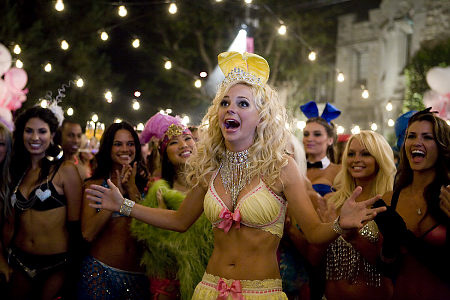 If everything else matched Faris' performance, we'd really have something here. Too bad director Fred Wolf (Strange Wilderness) doesn't seem to be interested in anything or anyone but her. The girls of the Zeta house never really get a chance to shine, either as characters or as comic creations. They all have one-note personalities which are never truly explored for emotions or laughs. One of them talks in a raspy voice, one of them wears a body brace, one of them is filled with angst, and there's one that's so shy, she remains inside a closet at all times, texting the other girls when she wants to speak. When Shelley starts teaching them how to open up and be popular, we don't really get a chance to see their transformation, as most of the girls are shoved in the background for the remainder of the film. There is a subplot where Shelley helps the head Zeta girl, Natalie, admit her feelings to a cute guy on campus, but very little is done with this subplot. The other main romantic subplot in the film, involving Shelley falling for a guy named Oliver (Colin Hanks, son of Tom) also never seems as strong as it should. Hanks is given very little to do in his scenes, other than give his co-star strange looks because of her bizarre behavior and observations. The only thing that held my interest is how much he resembles his famous father.
If everything else matched Faris' performance, we'd really have something here. Too bad director Fred Wolf (Strange Wilderness) doesn't seem to be interested in anything or anyone but her. The girls of the Zeta house never really get a chance to shine, either as characters or as comic creations. They all have one-note personalities which are never truly explored for emotions or laughs. One of them talks in a raspy voice, one of them wears a body brace, one of them is filled with angst, and there's one that's so shy, she remains inside a closet at all times, texting the other girls when she wants to speak. When Shelley starts teaching them how to open up and be popular, we don't really get a chance to see their transformation, as most of the girls are shoved in the background for the remainder of the film. There is a subplot where Shelley helps the head Zeta girl, Natalie, admit her feelings to a cute guy on campus, but very little is done with this subplot. The other main romantic subplot in the film, involving Shelley falling for a guy named Oliver (Colin Hanks, son of Tom) also never seems as strong as it should. Hanks is given very little to do in his scenes, other than give his co-star strange looks because of her bizarre behavior and observations. The only thing that held my interest is how much he resembles his famous father.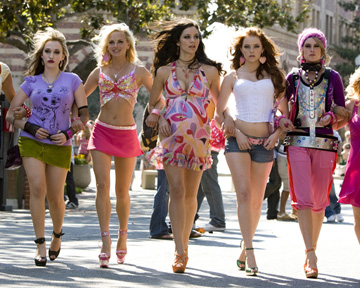
See the movie times in your area or buy the DVD at Amazon.com!






0 Comments:
Post a Comment
<< Home